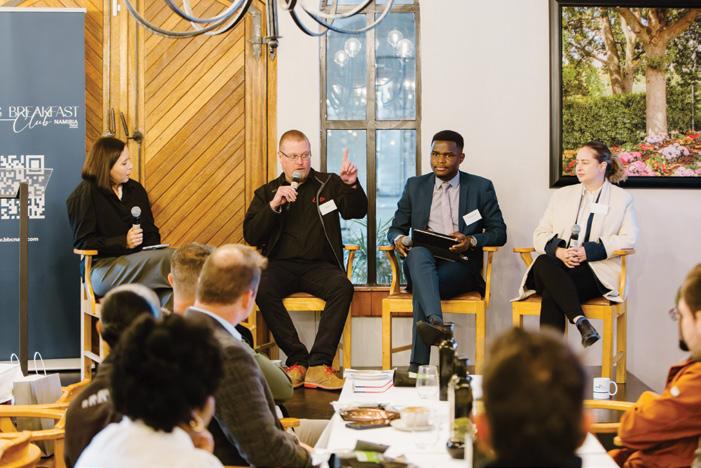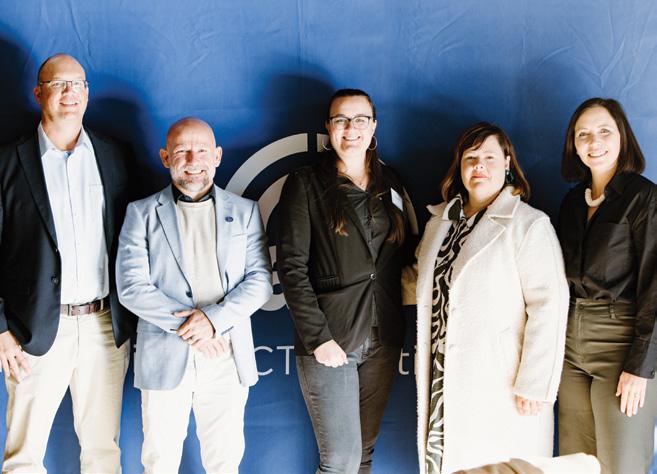
5 minute read
Envisioning Tomorrow: Cybersecurity
In today’s hyperconnected world, cybersecurity is no longer just an IT concern. It has become a business imperative, a governance priority, and increasingly a matter of national security. For Namibia, the ongoing digital transformation brings immense opportunities, but it also calls for serious attention to risk.
The second edition of this year’s Namibia Trade Network Business Breakfast Club, continuing under the theme “The Future – Envisioning Tomorrow”, focused on the crucial and complex issue of cybersecurity. Despite the winter chill, entrepreneurs and executives gathered at the Stellenbosch Wine Bar and Bistro for the event. Proudly sponsored by hosts AfricaOnline, the Business Breakfast Club once again welcomed a panel of distinguished experts to share their knowledge.
Digital progress offers promising opportunities for Namibia; yet, it remains essential to approach these advancements with clear-eyed caution, mindful of the vulnerabilities they introduce. From small businesses to government departments, healthcare providers and financial services, no sector is immune to the growing complexity and scale of cyber threats.
Panellists dove straight into unpacking the balance between the vulnerabilities and possibilities of our digital systems. Each offered valuable insights into how we can collaborate to protect digital infrastructure and data, educate industries, and stay ahead in a world where threats evolve as rapidly as the technology itself. The discussion brought together diverse voices from across the cybersecurity spectrum, including Mr Richard Broeke, Managing Director of the global cybersecurity firm Securicom. In conversation with fellow panellists Tanya Höpker from Meinert Cybersecurity and Mr Ndinomwene Modjila, Principal of IT Operations and Support at the Financial Intelligence Unit of the Government of the Republic of Namibia (FIC). Panelists addressed the urgent need to improve online literacy and the overall digital experience in Namibia. “We still have a long way to go in Namibia,” Tanya admitted, noting that the human element remains a constant in order to develop cybersecurity resilience.
Phishing emails, especially, are still among the most common threats in Namibia. In fact, they are alarmingly more prevalent and localised than ever before. With the help of artificial intelligence, these messages are being produced faster, with greater sophistication and more precise targeting. Because AI can automate the process, phishing campaigns are now cheaper to launch, which means small and medium enterprises are increasingly at risk. Approximately 30% of phishing emails in Namibia still reach their intended recipients – this figure represents a significant risk and highlights the urgent need for better awareness and training.
To approach cybersecurity in a practical way, Tanya Höpker outlines four practical ‘buckets’: prevent, detect, respond and recover. Categorising efforts in this way helps businesses identify what they need, whether it is maintaining offline backups, encrypting sensitive data or introducing other tailored safeguards.
The discussion also raised a critical question: what are the most pressing cyber challenges facing Namibia as a nation? The panel immediately agreed: legislation is urgently needed. Good governance and strong compliance frameworks are essential. If the right laws are implemented across national, sectoral and organisational levels, businesses will be better positioned to defend themselves against cyber threats.
Importantly, small steps can make a big difference. Many of the most effective solutions come at little or no cost. Multifactor authentication, for example, is widely available and easy to use, yet remains underutilised by many Namibian organisations. The same is true for well-managed password policies, which are often overlooked. Without basic safeguards in place, businesses become easy targets. As Broeke pointed out, the most effective tools are often the simplest.
In many organisations, basic IT hygiene is still lacking. Computers are often left unlocked, or only set to auto-lock after 30 minutes of inactivity. This is far too long to be effective. Password managers are another example of balancing security and usability. Instead of remembering multiple complex passwords, users can store them securely in one place, accessed through a single master password. This approach simplifies the user experience while significantly improving password security.
Artificial intelligence was another recurring theme in the discussion. Is it the dreaded digital overlord or a useful resource? Artificial intelligence is often seen as a threat, especially in the cybersecurity space. It is true that AI is being used by criminals to automate attacks and increase their impact. However, it can also be a powerful tool for defence. Businesses can use AI to detect unusual activity, respond automatically to threats and reinforce their overall security posture. Whether AI becomes a risk or a resource, though, depends entirely on how it is applied.
In Namibia, SMEs are particularly vulnerable to cyberattacks. Without the budget, infrastructure or dedicated security staff of larger companies, they are seen as easy targets by cybercriminals. This makes it even more important for SMEs to adopt affordable protective measures and invest in building awareness across their teams.
The next Business Breakfast Club will take place in August and will explore the theme of Corporate Governance in the modern business landscape.
Madeleen Duvenhage
To learn more or join a growing community of changemakers, visit www.bbcnam.com











